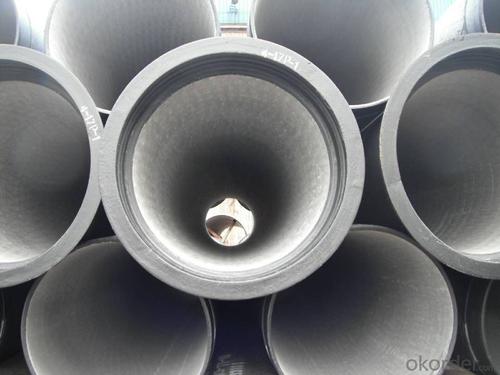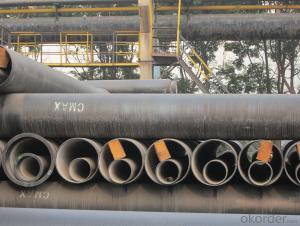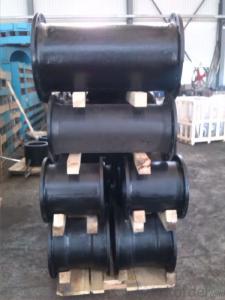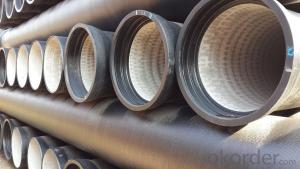DUCTILE IRON PIPE DN600
- Loading Port:
- China Main Port
- Payment Terms:
- TT OR LC
- Min Order Qty:
- -
- Supply Capability:
- -
OKorder Service Pledge
OKorder Financial Service
You Might Also Like
Specification:
1) The standard of pipe: ISO2531:1998, K9
2) Effective length: 6m
3) Inner cement line: Portland cement line as per ISO4179
4) Zinc coating: at least 130g/m2 as per ISO8179
5) Bitumen painting: at least 70um as per ISO8179
6) With 100% quantity of NBR ring, or SBR ring, or EPDM ring as per ISO4633
7) DN80mm-800mm
8) High strength, lighter than grey iron, good corrosion resistance, no furring, small flow resistance, easy fixing, long life tome about 100 yeas
9) Produced by Hangzhou chunfeng machine
10) Checked by automatic inspection equipment
11) Composition:
Chemical composition | |||
Chemical composition | Ductile Cast Iron Pipe (%) | Grey iron pipe (%) | Steel pipe (%) |
C | 3.5-4.0 | 3.2-3.8 | 0.1-0.2 |
Si | 1.9-2.6 | 1.4-2.2 | 0.15-0.4 |
Mn | 0.15-0.45 | 0.4-0.6 | 0.3-0.6 |
P | ≤0.06 | ≤0.3 | 0.02-0.03 |
S | ≤0.02 | ≤0.1 | 0.02-0.03 |
Mg | 0.03-0.06 |
|
|
12) Feature:
Mechanical properties | |||
| Ductile Cast Iron Pipe | Grey Iron Pipe | Steel Pipe |
Tensile Strength(Mpa) | ≥420 | 150-260 | ≥400 |
Yield Strength(Mpa) | ≥300 | No Confirmation | No Confirmation |
Bending Strength(Mpa) | ≥590 | 200-360 | ≥400 |
Elongation (%) | ≥10 | Neglected | ≥18 |
Brinell Hardness(HBS) | ≤230 | ≤230 | About 140 |
13) T type mechanical joint
14) Packing: in bulk or container
- Q: Can ductile iron pipes be used for underground fuel storage systems?
- No, ductile iron pipes are not suitable for underground fuel storage systems. They are more commonly used for water and sewer applications due to their strength and durability in carrying liquids. Underground fuel storage systems require materials that are specifically designed to handle the corrosive nature of fuel and prevent leaks or contamination, such as double-walled fiberglass or steel tanks.
- Q: What is the acceptance of cast iron pipe material?
- Specific acceptance, first of all in line with national standards, followed by the provisions of the contract, and then the project requirements. General contract and drawings will have the requirements and standards of pipe. I hope I can help you.
- Q: How does ductile iron pipe perform in areas with high soil contamination?
- Ductile iron pipe performs exceptionally well in areas with high soil contamination due to its inherent strength, durability, and corrosion resistance properties. The material used in manufacturing ductile iron pipes is highly resistant to chemical attack, making it suitable for handling various types of contaminated soils, including those with high levels of acids, alkalis, and other corrosive substances. The corrosion resistance of ductile iron pipes is primarily attributed to their protective internal and external linings, which are designed to prevent contact between the pipe material and the surrounding soil or fluids. These linings act as a barrier, preventing the penetration of corrosive elements and reducing the risk of pipe degradation or failure. Additionally, ductile iron pipes can be further protected by applying external coatings or cathodic protection systems, which enhance their resistance to soil contamination and extend their service life. In areas with high soil contamination, ductile iron pipes offer significant advantages over other materials such as steel or concrete. Their high strength allows them to withstand the external loads imposed by the contaminated soil, reducing the risk of structural failure or deformation. Moreover, the inherent flexibility of ductile iron allows it to absorb ground movements or settlement without compromising its integrity, making it a reliable choice for areas prone to soil instability or shifting. Furthermore, ductile iron pipes have a smooth internal surface, which minimizes friction and helps maintain efficient flow rates even in the presence of contaminants. This characteristic is particularly important in areas with high soil contamination, where debris or sedimentation can accumulate and hinder fluid flow. The smooth bore of ductile iron pipes reduces the risk of clogging and ensures the continuous and reliable conveyance of fluids, even in challenging soil conditions. Overall, ductile iron pipe is a highly suitable choice for areas with high soil contamination. Its excellent corrosion resistance, strength, flexibility, and smooth internal surface make it a reliable and durable solution for conveying fluids in these challenging environments.
- Q: Can ductile iron pipes be used for stormwater management systems?
- Yes, ductile iron pipes can be used for stormwater management systems. Ductile iron pipes are known for their strength, durability, and corrosion resistance, making them suitable for handling stormwater runoff. They can effectively transport large volumes of water and withstand the pressure and impact associated with stormwater management.
- Q: What are the typical surge anticipation measures for ductile iron pipe?
- Some typical surge anticipation measures for ductile iron pipe include using surge tanks or pressure relief valves, installing air release valves and surge suppressors, using flexible joint connections, and designing the pipeline with appropriate wall thickness and reinforcement.
- Q: What is the expected service life of ductile iron pipe?
- The expected service life of ductile iron pipe can vary depending on various factors such as the environment, soil conditions, water quality, and the level of maintenance and corrosion protection measures implemented. However, on average, ductile iron pipe is designed to have a service life of 75 to 100 years. This is due to its superior strength, durability, and resistance to corrosion. Ductile iron pipe is known for its ability to withstand harsh conditions and has been used extensively in water and wastewater systems, industrial applications, and other infrastructure projects. Regular maintenance and proper corrosion protection can further extend the service life of ductile iron pipe, ensuring its continued reliability and performance over many decades.
- Q: Are ductile iron pipes suitable for installation in areas with high traffic loads?
- Yes, ductile iron pipes are suitable for installation in areas with high traffic loads. Due to their inherent strength and durability, ductile iron pipes can withstand heavy loads and are commonly used in applications where there is significant vehicular traffic.
- Q: What is the weight of ductile iron pipe compared to other pipe materials?
- Ductile iron pipe is generally heavier than other pipe materials such as PVC or HDPE. Its weight can vary depending on the size and wall thickness of the pipe, but in general, ductile iron pipe is known for its durability and strength, which often results in a higher weight compared to other pipe materials.
- Q: What if the ductile iron pipe is broken?
- Ductile cast iron pipes are broken because of the excessive heat treatment during casting or the lack of proper addition in casting to prevent the proper change of the proper brittleness and cause the rupture to be effective.
- Q: What are the differences between cast iron pipes W and A?
- W type socket cast iron drainage pipe made of stainless steel flexible clamp connection in the construction of the installation; A type cast iron drainage pipe with flexible flange and sealing ring connection in the construction of the installation; B type cast iron drainage pipe comprehensive advantages of W type and A type cast iron drainage pipe, straight pipe part adopts W type bearing mouth of pipe, pipe fittings with double flange structure;
Send your message to us
DUCTILE IRON PIPE DN600
- Loading Port:
- China Main Port
- Payment Terms:
- TT OR LC
- Min Order Qty:
- -
- Supply Capability:
- -
OKorder Service Pledge
OKorder Financial Service
Similar products
Hot products
Hot Searches
Related keywords


























